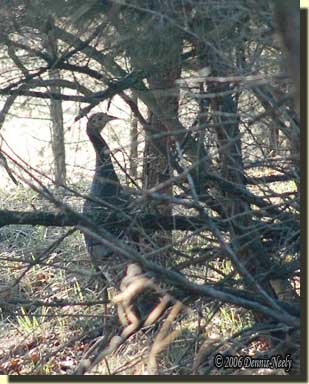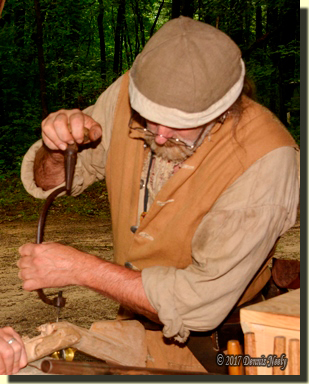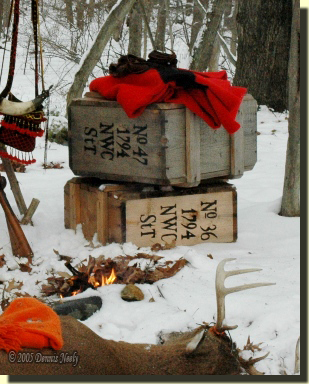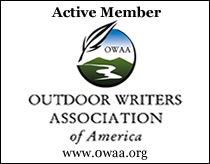A Tad Late Tuesday Missive…
Three deer matted frail grass. The largest depression rested higher up the hill than the other two—bedding not more than the night prior. “A doe and her fawns,” the hired hunter whispered, his breath drifting in a tiny cloud. He grounded the butt of his Northwest gun, knelt and surveyed the hillside from the vantage point of the old doe.
The late October air sliced through the linen hunting shirt, the wool, sleeveless waist coat and the osnaburg trade shirt. An involuntary shudder flew through his arms and torso. He decided as he crossed the ridge that he would unroll the crimson blanket once he found a suitable place to sit and await darkness. A single drip fell from his nose. Geese ke-honked to the south, winging their way to the River Raisin. “Too cold for October,” he whispered, “too cold.”
Twenty paces distant, at the crest of the cedar-covered knoll, an uprooted red cedar tree lay on the ground. The shallow roots, still filled with dirt, fanned upward, more than two trade gun lengths broad. The top’s full boughs, flush with fine, brown needles, pointed downhill. The obstruction was the only hindrance from that vantage point.
A dozen judicious whacks of the ax cleaved a lair where the trunk once met the ground. A buffalo-hide moccasin cleared the duff. The woodsman draped the trade blanket over his left shoulder and under his right, pulled it tight around his rump, and sat cross-legged. He checked the smoothbore’s prime and eased back.
A grey squirrel meandered cedar to cedar, well up, hidden in the shadows. Bouncing boughs marked its progress as it worked its way back to the solitary red oak that held its nest, a large clump of leaves, tight packed and woven among wispy branches. The backcountry hunter considered the squirrel, but passed, hoping a wild turkey might wander by on the way to its roost.
Snow, round and hard like ice balls, began popping through the overhead branches. A cold gust brought big flakes, slow at first, then a torrent like a spring downpour. Twenty minutes passed. The ground had a white coating with black circles under each cedar tree. Snowflakes gathered in the blanket folds.

Then a bronze silhouette herky-jerked into view from behind the root fan, thirty-plus paces to the south. Another appeared, and another, and another. Two wandered in from beyond the tree-top foliage, perhaps twenty-five paces out. In all, fifteen wild turkeys milled about, clucking and popping and acting nervous. “The young ones first snow,” he thought as he squinted and avoided eye contact.
The Northwest gun, its firelock tucked under the trade blanket, near the black shoots that marked its value in beaver, remained across the woodsman’s hunt-stained buckskin leggins.
It was too dark to unleash the death bees, too risky, and experience dictated the birds would putt and fly at the first attempt to raise the trade gun. “No, it is best to sit, and wait until total darkness, then slip away,” he thought as the farthest hen flapped her big wings and rose up into oblivion…
Three Words of Importance
Happenstance sometimes traps a forest tenant. Such was the case on that cold October evening in 1796. The first turkey was too far out, the others added piercing eyes, all keen on detecting danger as the flock came to roost. The two that walked just beyond the cedar’s top were doable, if a half dozen variables all fell into place in a matter of heartbeats. Once again, a gamble that was too great to take.
Another factor that never makes its way into the post hunter’s journal entries, thanks to a healthy dose of measured compromise, is the influence of modern game laws. It was after legal shooting hours. That circumstance happens often, having game come in after hours. Over the years, depending on the situation, I prefer to sit and wait out the forest tenant, either hoping it leaves before I must get up or, as in the case of the wild turkeys, the birds fly up.
Being pinned down in the wilderness classroom affords time to mull and cogitate. “Crazy thought time,” as I like to say. This is the time to wonder, to ask questions that don’t occur in the course of normal research. This is “what if” time, too, as well as quiet moments devoted to working out problems or anomalies discovered under hands-on experimentation. And sometimes, crazy thought time occurs when one least expects it.
Not long ago, I was working on a drawing for the log lean-to that I hope to start when the weather tempers a bit. As I sketched out details, a thought occurred to me: “How did they drill holes?” I’ve charred small holes with irons heated red hot in the fire, twisted the awl and rubbed a square piece of steel back and forth in my hands, all creating the needed hole. I’ve never tried a bow drill.

Gunsmiths and woodworkers brought basic tools with them, gimlets and crude drills show up in personal inventories in the 18th-century. But what of the hired hunter, gathering meat for the trading post clerk? As an itinerant woodsman, personal possessions are meager at best. His only other resources are those packed into the backcountry by the trading company clerk.
In the process of working on the drawings, I consulted George Nelson’s description of the construction details of his trading post. As so often happens with any historical passage, multiple hints appear to other questions, some only a few words long. One of Nelson’s sentences caught my attention:
“…Our beds, two posts, at the head & foot with a stick fixed, one in the post & the other in an augar hole (when we happen to have such article) or forced into one of the chinks of the house…” (Nelson, 59).
A golden nugget, hidden in the midst of a couple of paragraphs devoted to explaining the construction of the trading post, caught the light and sparkled a bit. With heart pounding and deep breaths, more so than when the flock circled in to roost, I penned a quick note to myself and placed a marker tab on the page.
Three words and a parenthetical comment held the key: “…an augar hole (when we happen to have such article)…” Nelson’s post had one or more auger bits.
One of my “go-to” resources when I’m looking for a second primary source is the inventory of goods sent by William and John Kay to David McCrea at Michilimackinac in 1777. In this inventory, each bale or crate is numbered with a list of goods included and their cost. Knowing the inventory, I skipped to the end where the post supplies are listed.
Much to my surprise, the joke was on me. You see, dear reader, about twenty years ago, I put together two crates based on examples at Michilimackinac. At the time, I found myself in the middle of a great primary documentation conflab, which found resolution a few years later, but that is another story.

The depth of the crates varied, the thinner one is marked “No. 36,” which held “84 lb. Castile Soap.” The larger one “No. 47,” held iron goods: “24 half axes, 24 Tomahawks, 3 Large axes, 7 Tranches [cutting knife], 2 Augures, 1 Tille [Slater’s hammer], and 1 Pioche [pick-axe]“ (Armour, At the Crossroads, 205).
And there they were, “2 Augures,” mixed in with the contents of the crate that sometimes sits next to the hired post hunter’s woodland campsite.
I have two “T”-handle auger bits in the shop, sitting behind my vintage, wooden moulding planes. Someone else’s household goods (a kind deed on my part) are stacked in front of that workbench, but the plan is to hunt down those auger bits, check the diameter and condition with the intent of boring “an augar hole” in a lean-to shelter’s log to accommodate a bed frame rail. Such are the fruits of “crazy thought time…”
Give traditional black powder hunting a try, be safe and may God bless you.


